Organisation Behaviour of GSK
VerifiedAdded on 2023/04/10
|14
|4164
|281
AI Summary
This report focuses on the organizational behavior of Glaxo Smith Kline (GSK), including its culture, structure, leadership styles, and motivation theories. It examines the relationship between the organization's structure and culture, factors influencing employee behavior, and the impact of different leadership styles on employee motivation. The report also discusses management approaches and teamwork at GSK.
Contribute Materials
Your contribution can guide someone’s learning journey. Share your
documents today.
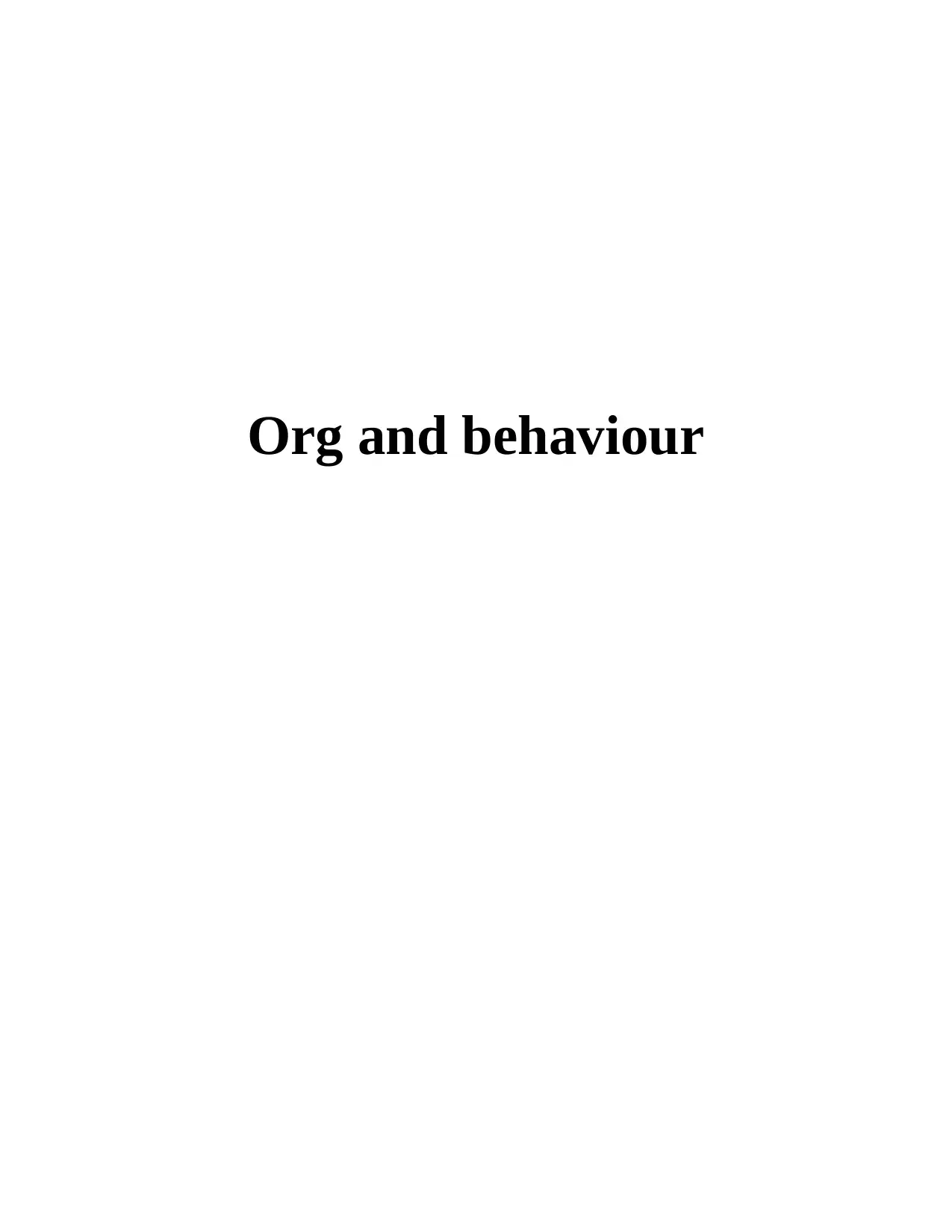
Org and behaviour
Secure Best Marks with AI Grader
Need help grading? Try our AI Grader for instant feedback on your assignments.
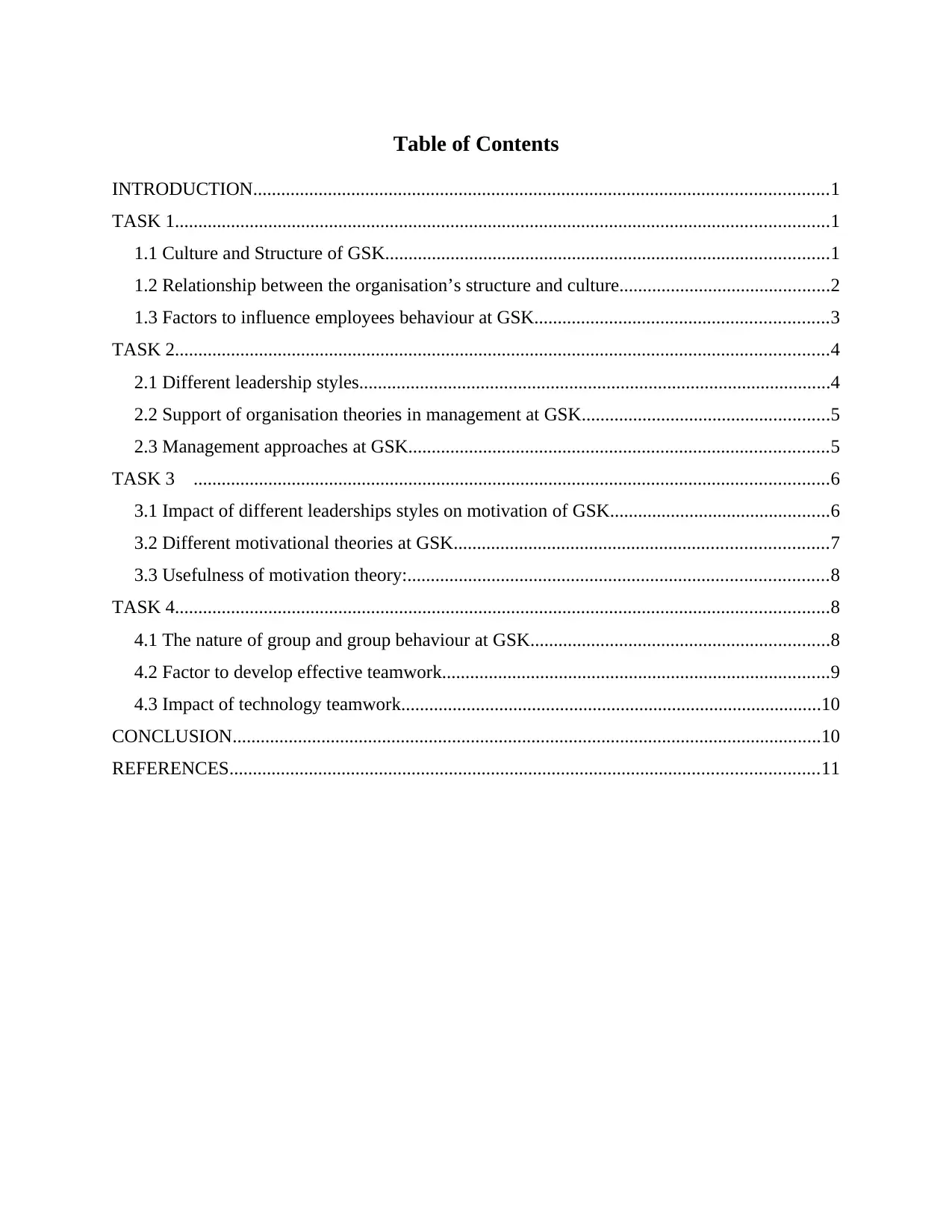
Table of Contents
INTRODUCTION...........................................................................................................................1
TASK 1............................................................................................................................................1
1.1 Culture and Structure of GSK...............................................................................................1
1.2 Relationship between the organisation’s structure and culture.............................................2
1.3 Factors to influence employees behaviour at GSK...............................................................3
TASK 2............................................................................................................................................4
2.1 Different leadership styles.....................................................................................................4
2.2 Support of organisation theories in management at GSK.....................................................5
2.3 Management approaches at GSK..........................................................................................5
TASK 3 ........................................................................................................................................6
3.1 Impact of different leaderships styles on motivation of GSK...............................................6
3.2 Different motivational theories at GSK................................................................................7
3.3 Usefulness of motivation theory:..........................................................................................8
TASK 4............................................................................................................................................8
4.1 The nature of group and group behaviour at GSK................................................................8
4.2 Factor to develop effective teamwork...................................................................................9
4.3 Impact of technology teamwork..........................................................................................10
CONCLUSION..............................................................................................................................10
REFERENCES..............................................................................................................................11
INTRODUCTION...........................................................................................................................1
TASK 1............................................................................................................................................1
1.1 Culture and Structure of GSK...............................................................................................1
1.2 Relationship between the organisation’s structure and culture.............................................2
1.3 Factors to influence employees behaviour at GSK...............................................................3
TASK 2............................................................................................................................................4
2.1 Different leadership styles.....................................................................................................4
2.2 Support of organisation theories in management at GSK.....................................................5
2.3 Management approaches at GSK..........................................................................................5
TASK 3 ........................................................................................................................................6
3.1 Impact of different leaderships styles on motivation of GSK...............................................6
3.2 Different motivational theories at GSK................................................................................7
3.3 Usefulness of motivation theory:..........................................................................................8
TASK 4............................................................................................................................................8
4.1 The nature of group and group behaviour at GSK................................................................8
4.2 Factor to develop effective teamwork...................................................................................9
4.3 Impact of technology teamwork..........................................................................................10
CONCLUSION..............................................................................................................................10
REFERENCES..............................................................................................................................11
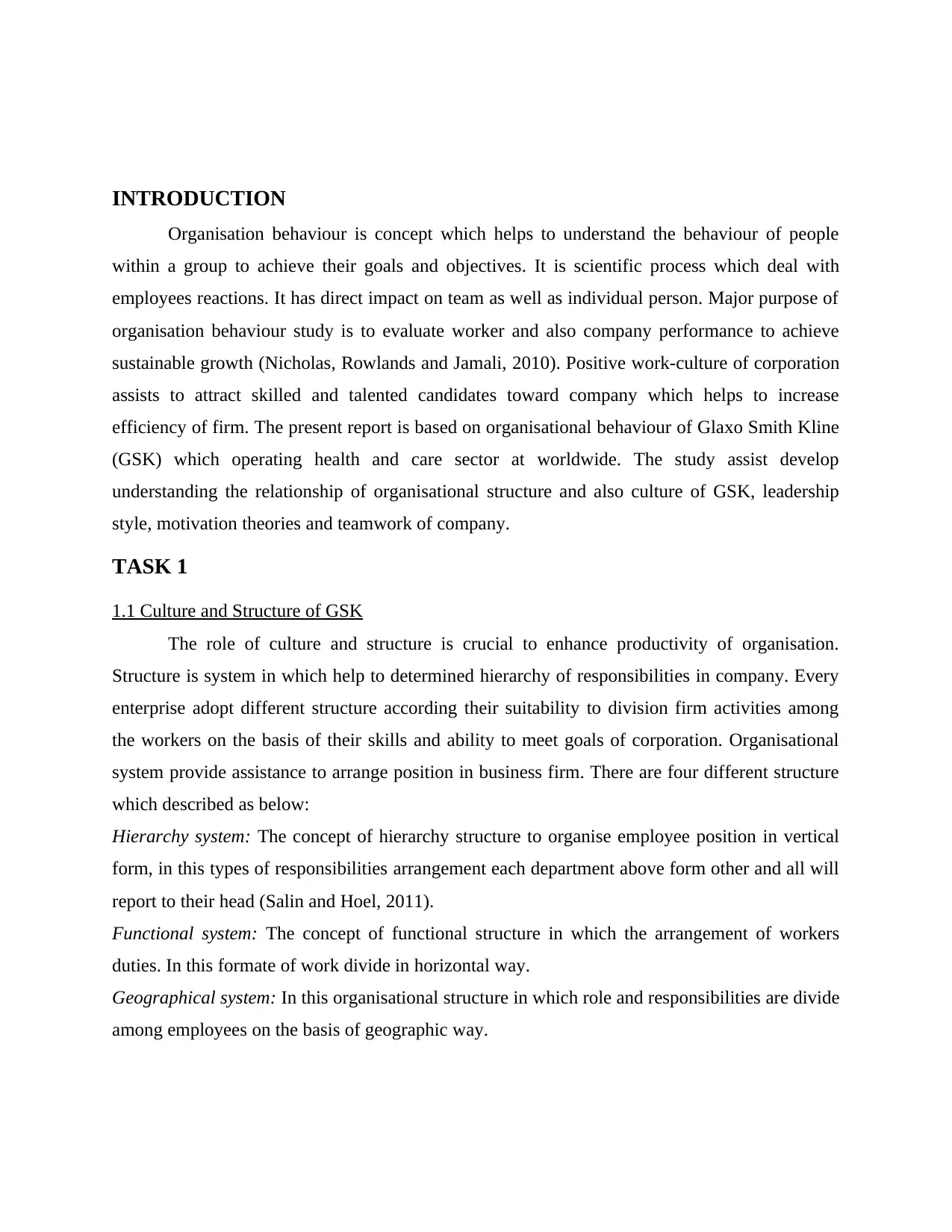
INTRODUCTION
Organisation behaviour is concept which helps to understand the behaviour of people
within a group to achieve their goals and objectives. It is scientific process which deal with
employees reactions. It has direct impact on team as well as individual person. Major purpose of
organisation behaviour study is to evaluate worker and also company performance to achieve
sustainable growth (Nicholas, Rowlands and Jamali, 2010). Positive work-culture of corporation
assists to attract skilled and talented candidates toward company which helps to increase
efficiency of firm. The present report is based on organisational behaviour of Glaxo Smith Kline
(GSK) which operating health and care sector at worldwide. The study assist develop
understanding the relationship of organisational structure and also culture of GSK, leadership
style, motivation theories and teamwork of company.
TASK 1
1.1 Culture and Structure of GSK
The role of culture and structure is crucial to enhance productivity of organisation.
Structure is system in which help to determined hierarchy of responsibilities in company. Every
enterprise adopt different structure according their suitability to division firm activities among
the workers on the basis of their skills and ability to meet goals of corporation. Organisational
system provide assistance to arrange position in business firm. There are four different structure
which described as below:
Hierarchy system: The concept of hierarchy structure to organise employee position in vertical
form, in this types of responsibilities arrangement each department above form other and all will
report to their head (Salin and Hoel, 2011).
Functional system: The concept of functional structure in which the arrangement of workers
duties. In this formate of work divide in horizontal way.
Geographical system: In this organisational structure in which role and responsibilities are divide
among employees on the basis of geographic way.
Organisation behaviour is concept which helps to understand the behaviour of people
within a group to achieve their goals and objectives. It is scientific process which deal with
employees reactions. It has direct impact on team as well as individual person. Major purpose of
organisation behaviour study is to evaluate worker and also company performance to achieve
sustainable growth (Nicholas, Rowlands and Jamali, 2010). Positive work-culture of corporation
assists to attract skilled and talented candidates toward company which helps to increase
efficiency of firm. The present report is based on organisational behaviour of Glaxo Smith Kline
(GSK) which operating health and care sector at worldwide. The study assist develop
understanding the relationship of organisational structure and also culture of GSK, leadership
style, motivation theories and teamwork of company.
TASK 1
1.1 Culture and Structure of GSK
The role of culture and structure is crucial to enhance productivity of organisation.
Structure is system in which help to determined hierarchy of responsibilities in company. Every
enterprise adopt different structure according their suitability to division firm activities among
the workers on the basis of their skills and ability to meet goals of corporation. Organisational
system provide assistance to arrange position in business firm. There are four different structure
which described as below:
Hierarchy system: The concept of hierarchy structure to organise employee position in vertical
form, in this types of responsibilities arrangement each department above form other and all will
report to their head (Salin and Hoel, 2011).
Functional system: The concept of functional structure in which the arrangement of workers
duties. In this formate of work divide in horizontal way.
Geographical system: In this organisational structure in which role and responsibilities are divide
among employees on the basis of geographic way.
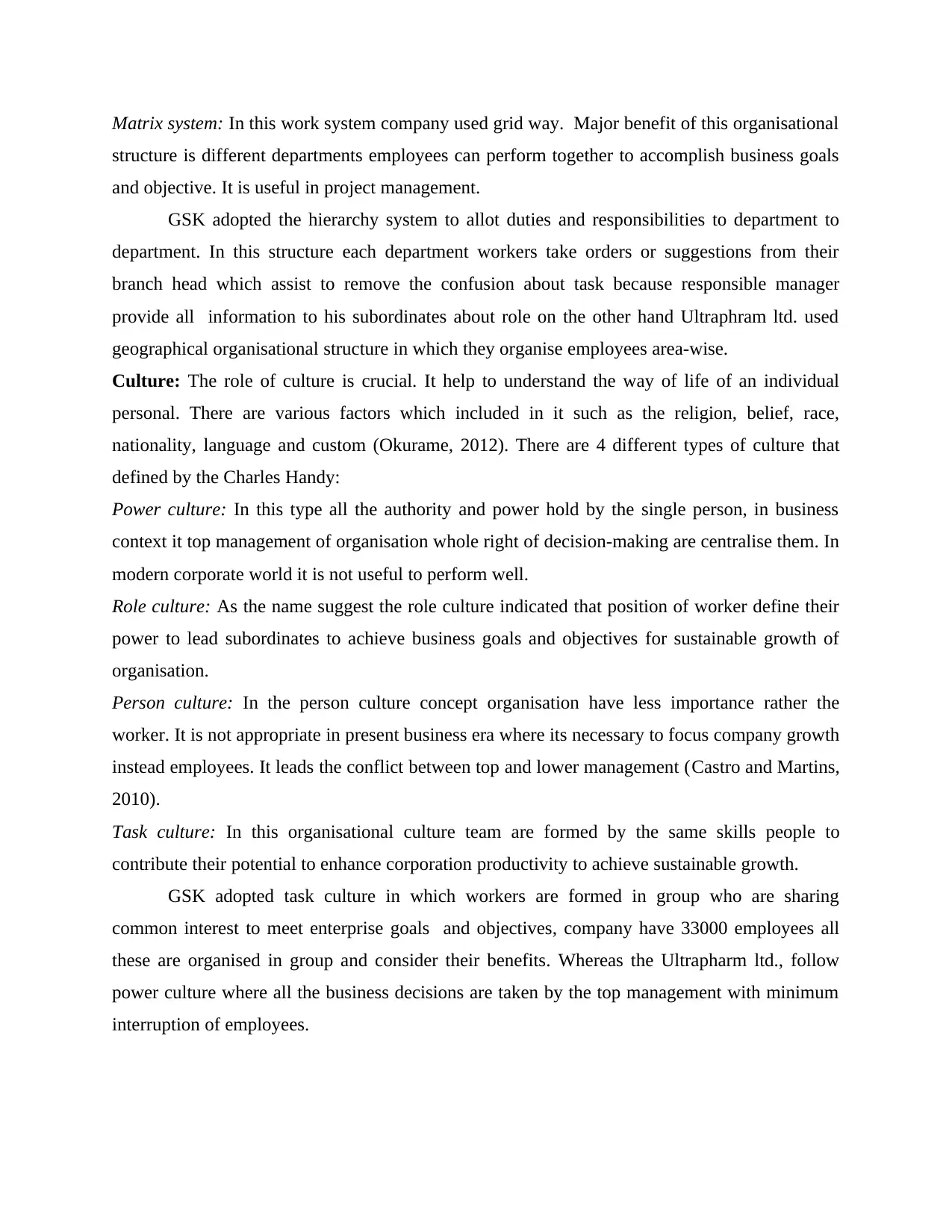
Matrix system: In this work system company used grid way. Major benefit of this organisational
structure is different departments employees can perform together to accomplish business goals
and objective. It is useful in project management.
GSK adopted the hierarchy system to allot duties and responsibilities to department to
department. In this structure each department workers take orders or suggestions from their
branch head which assist to remove the confusion about task because responsible manager
provide all information to his subordinates about role on the other hand Ultraphram ltd. used
geographical organisational structure in which they organise employees area-wise.
Culture: The role of culture is crucial. It help to understand the way of life of an individual
personal. There are various factors which included in it such as the religion, belief, race,
nationality, language and custom (Okurame, 2012). There are 4 different types of culture that
defined by the Charles Handy:
Power culture: In this type all the authority and power hold by the single person, in business
context it top management of organisation whole right of decision-making are centralise them. In
modern corporate world it is not useful to perform well.
Role culture: As the name suggest the role culture indicated that position of worker define their
power to lead subordinates to achieve business goals and objectives for sustainable growth of
organisation.
Person culture: In the person culture concept organisation have less importance rather the
worker. It is not appropriate in present business era where its necessary to focus company growth
instead employees. It leads the conflict between top and lower management (Castro and Martins,
2010).
Task culture: In this organisational culture team are formed by the same skills people to
contribute their potential to enhance corporation productivity to achieve sustainable growth.
GSK adopted task culture in which workers are formed in group who are sharing
common interest to meet enterprise goals and objectives, company have 33000 employees all
these are organised in group and consider their benefits. Whereas the Ultrapharm ltd., follow
power culture where all the business decisions are taken by the top management with minimum
interruption of employees.
structure is different departments employees can perform together to accomplish business goals
and objective. It is useful in project management.
GSK adopted the hierarchy system to allot duties and responsibilities to department to
department. In this structure each department workers take orders or suggestions from their
branch head which assist to remove the confusion about task because responsible manager
provide all information to his subordinates about role on the other hand Ultraphram ltd. used
geographical organisational structure in which they organise employees area-wise.
Culture: The role of culture is crucial. It help to understand the way of life of an individual
personal. There are various factors which included in it such as the religion, belief, race,
nationality, language and custom (Okurame, 2012). There are 4 different types of culture that
defined by the Charles Handy:
Power culture: In this type all the authority and power hold by the single person, in business
context it top management of organisation whole right of decision-making are centralise them. In
modern corporate world it is not useful to perform well.
Role culture: As the name suggest the role culture indicated that position of worker define their
power to lead subordinates to achieve business goals and objectives for sustainable growth of
organisation.
Person culture: In the person culture concept organisation have less importance rather the
worker. It is not appropriate in present business era where its necessary to focus company growth
instead employees. It leads the conflict between top and lower management (Castro and Martins,
2010).
Task culture: In this organisational culture team are formed by the same skills people to
contribute their potential to enhance corporation productivity to achieve sustainable growth.
GSK adopted task culture in which workers are formed in group who are sharing
common interest to meet enterprise goals and objectives, company have 33000 employees all
these are organised in group and consider their benefits. Whereas the Ultrapharm ltd., follow
power culture where all the business decisions are taken by the top management with minimum
interruption of employees.
Secure Best Marks with AI Grader
Need help grading? Try our AI Grader for instant feedback on your assignments.
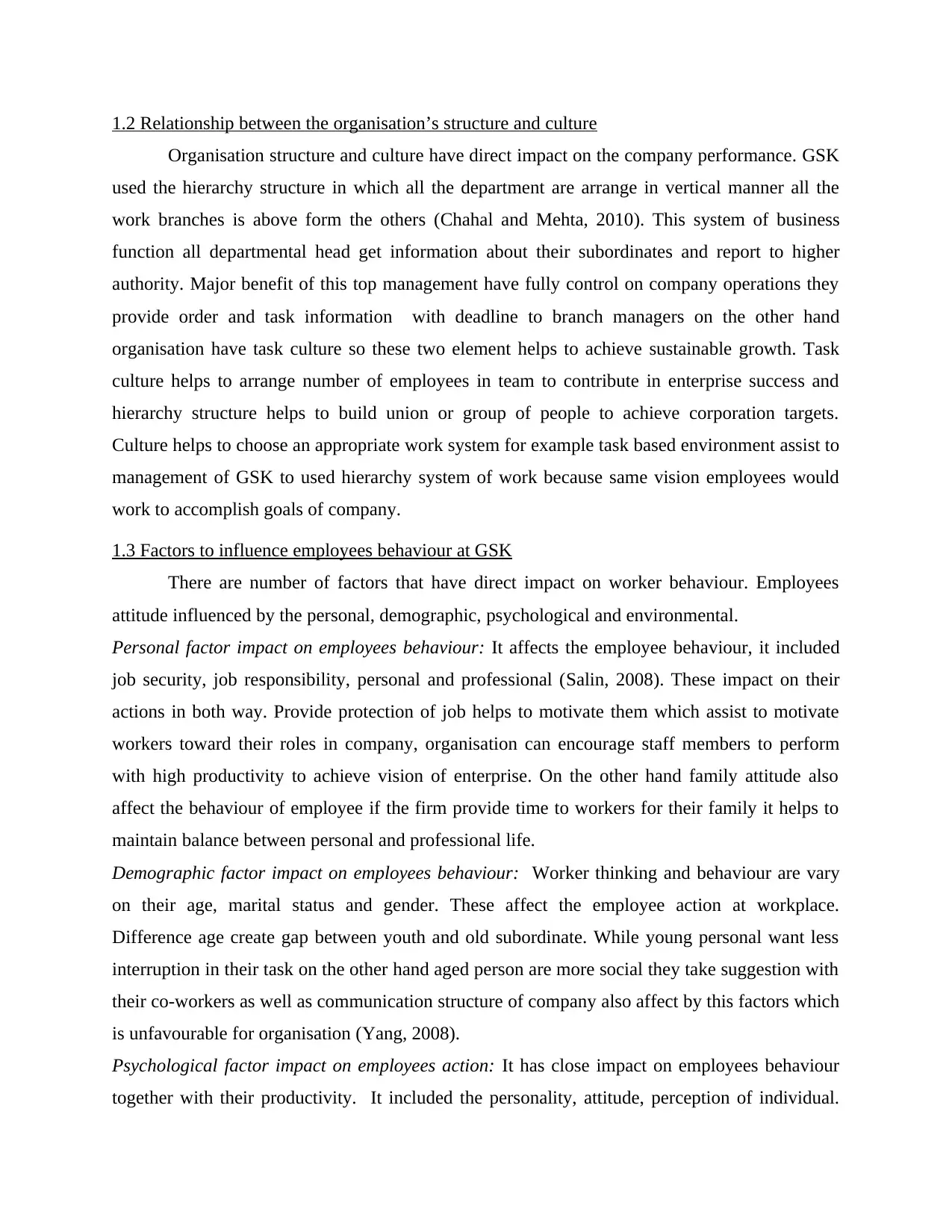
1.2 Relationship between the organisation’s structure and culture
Organisation structure and culture have direct impact on the company performance. GSK
used the hierarchy structure in which all the department are arrange in vertical manner all the
work branches is above form the others (Chahal and Mehta, 2010). This system of business
function all departmental head get information about their subordinates and report to higher
authority. Major benefit of this top management have fully control on company operations they
provide order and task information with deadline to branch managers on the other hand
organisation have task culture so these two element helps to achieve sustainable growth. Task
culture helps to arrange number of employees in team to contribute in enterprise success and
hierarchy structure helps to build union or group of people to achieve corporation targets.
Culture helps to choose an appropriate work system for example task based environment assist to
management of GSK to used hierarchy system of work because same vision employees would
work to accomplish goals of company.
1.3 Factors to influence employees behaviour at GSK
There are number of factors that have direct impact on worker behaviour. Employees
attitude influenced by the personal, demographic, psychological and environmental.
Personal factor impact on employees behaviour: It affects the employee behaviour, it included
job security, job responsibility, personal and professional (Salin, 2008). These impact on their
actions in both way. Provide protection of job helps to motivate them which assist to motivate
workers toward their roles in company, organisation can encourage staff members to perform
with high productivity to achieve vision of enterprise. On the other hand family attitude also
affect the behaviour of employee if the firm provide time to workers for their family it helps to
maintain balance between personal and professional life.
Demographic factor impact on employees behaviour: Worker thinking and behaviour are vary
on their age, marital status and gender. These affect the employee action at workplace.
Difference age create gap between youth and old subordinate. While young personal want less
interruption in their task on the other hand aged person are more social they take suggestion with
their co-workers as well as communication structure of company also affect by this factors which
is unfavourable for organisation (Yang, 2008).
Psychological factor impact on employees action: It has close impact on employees behaviour
together with their productivity. It included the personality, attitude, perception of individual.
Organisation structure and culture have direct impact on the company performance. GSK
used the hierarchy structure in which all the department are arrange in vertical manner all the
work branches is above form the others (Chahal and Mehta, 2010). This system of business
function all departmental head get information about their subordinates and report to higher
authority. Major benefit of this top management have fully control on company operations they
provide order and task information with deadline to branch managers on the other hand
organisation have task culture so these two element helps to achieve sustainable growth. Task
culture helps to arrange number of employees in team to contribute in enterprise success and
hierarchy structure helps to build union or group of people to achieve corporation targets.
Culture helps to choose an appropriate work system for example task based environment assist to
management of GSK to used hierarchy system of work because same vision employees would
work to accomplish goals of company.
1.3 Factors to influence employees behaviour at GSK
There are number of factors that have direct impact on worker behaviour. Employees
attitude influenced by the personal, demographic, psychological and environmental.
Personal factor impact on employees behaviour: It affects the employee behaviour, it included
job security, job responsibility, personal and professional (Salin, 2008). These impact on their
actions in both way. Provide protection of job helps to motivate them which assist to motivate
workers toward their roles in company, organisation can encourage staff members to perform
with high productivity to achieve vision of enterprise. On the other hand family attitude also
affect the behaviour of employee if the firm provide time to workers for their family it helps to
maintain balance between personal and professional life.
Demographic factor impact on employees behaviour: Worker thinking and behaviour are vary
on their age, marital status and gender. These affect the employee action at workplace.
Difference age create gap between youth and old subordinate. While young personal want less
interruption in their task on the other hand aged person are more social they take suggestion with
their co-workers as well as communication structure of company also affect by this factors which
is unfavourable for organisation (Yang, 2008).
Psychological factor impact on employees action: It has close impact on employees behaviour
together with their productivity. It included the personality, attitude, perception of individual.
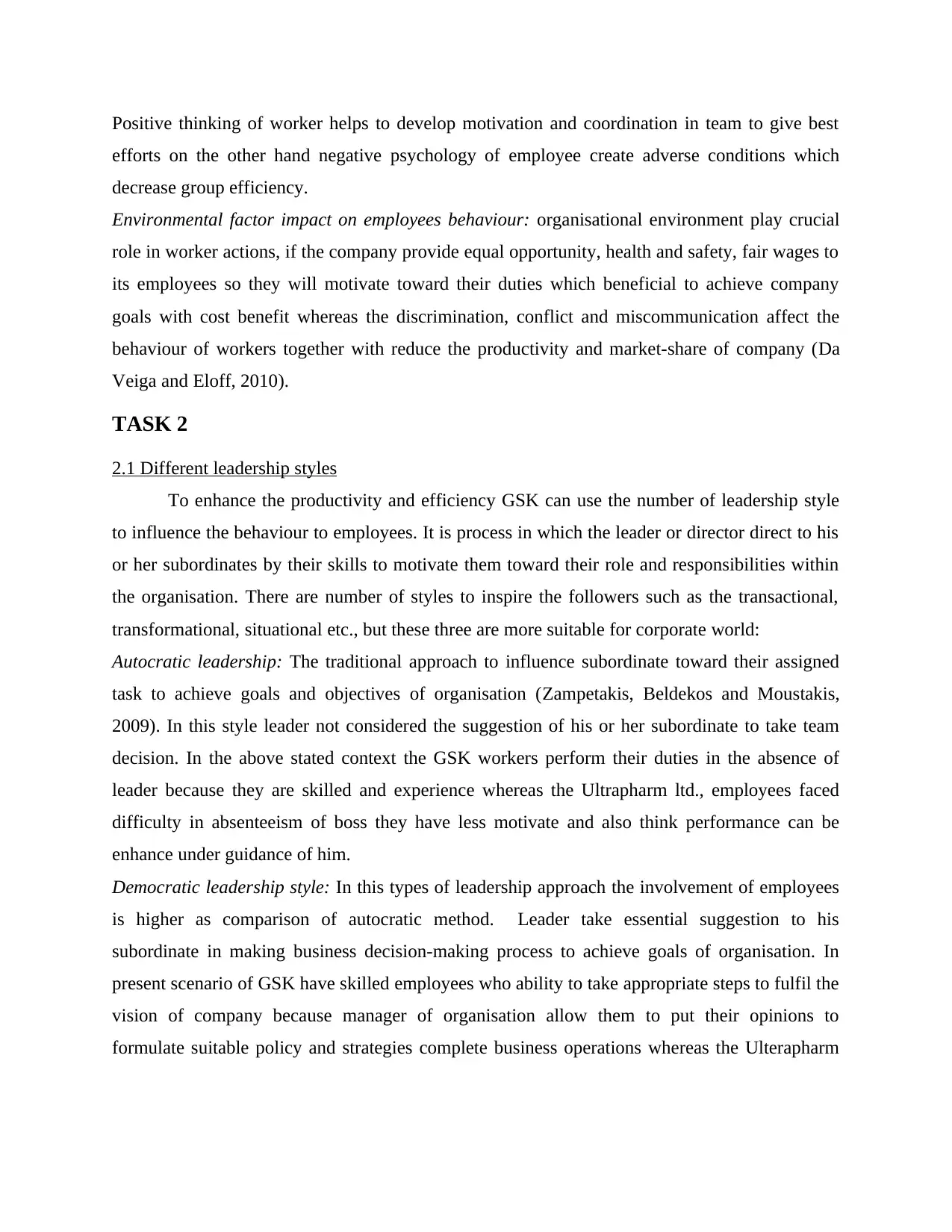
Positive thinking of worker helps to develop motivation and coordination in team to give best
efforts on the other hand negative psychology of employee create adverse conditions which
decrease group efficiency.
Environmental factor impact on employees behaviour: organisational environment play crucial
role in worker actions, if the company provide equal opportunity, health and safety, fair wages to
its employees so they will motivate toward their duties which beneficial to achieve company
goals with cost benefit whereas the discrimination, conflict and miscommunication affect the
behaviour of workers together with reduce the productivity and market-share of company (Da
Veiga and Eloff, 2010).
TASK 2
2.1 Different leadership styles
To enhance the productivity and efficiency GSK can use the number of leadership style
to influence the behaviour to employees. It is process in which the leader or director direct to his
or her subordinates by their skills to motivate them toward their role and responsibilities within
the organisation. There are number of styles to inspire the followers such as the transactional,
transformational, situational etc., but these three are more suitable for corporate world:
Autocratic leadership: The traditional approach to influence subordinate toward their assigned
task to achieve goals and objectives of organisation (Zampetakis, Beldekos and Moustakis,
2009). In this style leader not considered the suggestion of his or her subordinate to take team
decision. In the above stated context the GSK workers perform their duties in the absence of
leader because they are skilled and experience whereas the Ultrapharm ltd., employees faced
difficulty in absenteeism of boss they have less motivate and also think performance can be
enhance under guidance of him.
Democratic leadership style: In this types of leadership approach the involvement of employees
is higher as comparison of autocratic method. Leader take essential suggestion to his
subordinate in making business decision-making process to achieve goals of organisation. In
present scenario of GSK have skilled employees who ability to take appropriate steps to fulfil the
vision of company because manager of organisation allow them to put their opinions to
formulate suitable policy and strategies complete business operations whereas the Ulterapharm
efforts on the other hand negative psychology of employee create adverse conditions which
decrease group efficiency.
Environmental factor impact on employees behaviour: organisational environment play crucial
role in worker actions, if the company provide equal opportunity, health and safety, fair wages to
its employees so they will motivate toward their duties which beneficial to achieve company
goals with cost benefit whereas the discrimination, conflict and miscommunication affect the
behaviour of workers together with reduce the productivity and market-share of company (Da
Veiga and Eloff, 2010).
TASK 2
2.1 Different leadership styles
To enhance the productivity and efficiency GSK can use the number of leadership style
to influence the behaviour to employees. It is process in which the leader or director direct to his
or her subordinates by their skills to motivate them toward their role and responsibilities within
the organisation. There are number of styles to inspire the followers such as the transactional,
transformational, situational etc., but these three are more suitable for corporate world:
Autocratic leadership: The traditional approach to influence subordinate toward their assigned
task to achieve goals and objectives of organisation (Zampetakis, Beldekos and Moustakis,
2009). In this style leader not considered the suggestion of his or her subordinate to take team
decision. In the above stated context the GSK workers perform their duties in the absence of
leader because they are skilled and experience whereas the Ultrapharm ltd., employees faced
difficulty in absenteeism of boss they have less motivate and also think performance can be
enhance under guidance of him.
Democratic leadership style: In this types of leadership approach the involvement of employees
is higher as comparison of autocratic method. Leader take essential suggestion to his
subordinate in making business decision-making process to achieve goals of organisation. In
present scenario of GSK have skilled employees who ability to take appropriate steps to fulfil the
vision of company because manager of organisation allow them to put their opinions to
formulate suitable policy and strategies complete business operations whereas the Ulterapharm
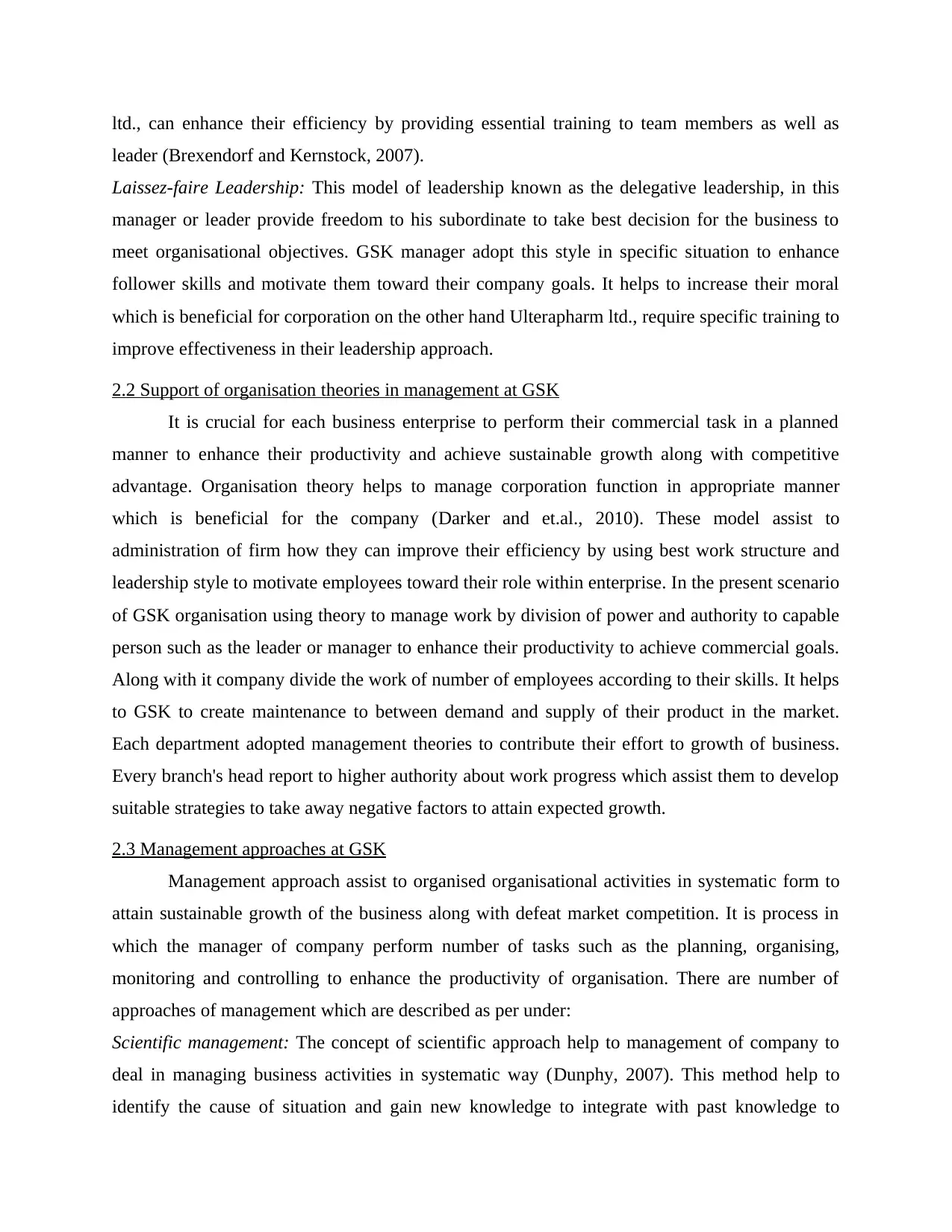
ltd., can enhance their efficiency by providing essential training to team members as well as
leader (Brexendorf and Kernstock, 2007).
Laissez-faire Leadership: This model of leadership known as the delegative leadership, in this
manager or leader provide freedom to his subordinate to take best decision for the business to
meet organisational objectives. GSK manager adopt this style in specific situation to enhance
follower skills and motivate them toward their company goals. It helps to increase their moral
which is beneficial for corporation on the other hand Ulterapharm ltd., require specific training to
improve effectiveness in their leadership approach.
2.2 Support of organisation theories in management at GSK
It is crucial for each business enterprise to perform their commercial task in a planned
manner to enhance their productivity and achieve sustainable growth along with competitive
advantage. Organisation theory helps to manage corporation function in appropriate manner
which is beneficial for the company (Darker and et.al., 2010). These model assist to
administration of firm how they can improve their efficiency by using best work structure and
leadership style to motivate employees toward their role within enterprise. In the present scenario
of GSK organisation using theory to manage work by division of power and authority to capable
person such as the leader or manager to enhance their productivity to achieve commercial goals.
Along with it company divide the work of number of employees according to their skills. It helps
to GSK to create maintenance to between demand and supply of their product in the market.
Each department adopted management theories to contribute their effort to growth of business.
Every branch's head report to higher authority about work progress which assist them to develop
suitable strategies to take away negative factors to attain expected growth.
2.3 Management approaches at GSK
Management approach assist to organised organisational activities in systematic form to
attain sustainable growth of the business along with defeat market competition. It is process in
which the manager of company perform number of tasks such as the planning, organising,
monitoring and controlling to enhance the productivity of organisation. There are number of
approaches of management which are described as per under:
Scientific management: The concept of scientific approach help to management of company to
deal in managing business activities in systematic way (Dunphy, 2007). This method help to
identify the cause of situation and gain new knowledge to integrate with past knowledge to
leader (Brexendorf and Kernstock, 2007).
Laissez-faire Leadership: This model of leadership known as the delegative leadership, in this
manager or leader provide freedom to his subordinate to take best decision for the business to
meet organisational objectives. GSK manager adopt this style in specific situation to enhance
follower skills and motivate them toward their company goals. It helps to increase their moral
which is beneficial for corporation on the other hand Ulterapharm ltd., require specific training to
improve effectiveness in their leadership approach.
2.2 Support of organisation theories in management at GSK
It is crucial for each business enterprise to perform their commercial task in a planned
manner to enhance their productivity and achieve sustainable growth along with competitive
advantage. Organisation theory helps to manage corporation function in appropriate manner
which is beneficial for the company (Darker and et.al., 2010). These model assist to
administration of firm how they can improve their efficiency by using best work structure and
leadership style to motivate employees toward their role within enterprise. In the present scenario
of GSK organisation using theory to manage work by division of power and authority to capable
person such as the leader or manager to enhance their productivity to achieve commercial goals.
Along with it company divide the work of number of employees according to their skills. It helps
to GSK to create maintenance to between demand and supply of their product in the market.
Each department adopted management theories to contribute their effort to growth of business.
Every branch's head report to higher authority about work progress which assist them to develop
suitable strategies to take away negative factors to attain expected growth.
2.3 Management approaches at GSK
Management approach assist to organised organisational activities in systematic form to
attain sustainable growth of the business along with defeat market competition. It is process in
which the manager of company perform number of tasks such as the planning, organising,
monitoring and controlling to enhance the productivity of organisation. There are number of
approaches of management which are described as per under:
Scientific management: The concept of scientific approach help to management of company to
deal in managing business activities in systematic way (Dunphy, 2007). This method help to
identify the cause of situation and gain new knowledge to integrate with past knowledge to
Paraphrase This Document
Need a fresh take? Get an instant paraphrase of this document with our AI Paraphraser
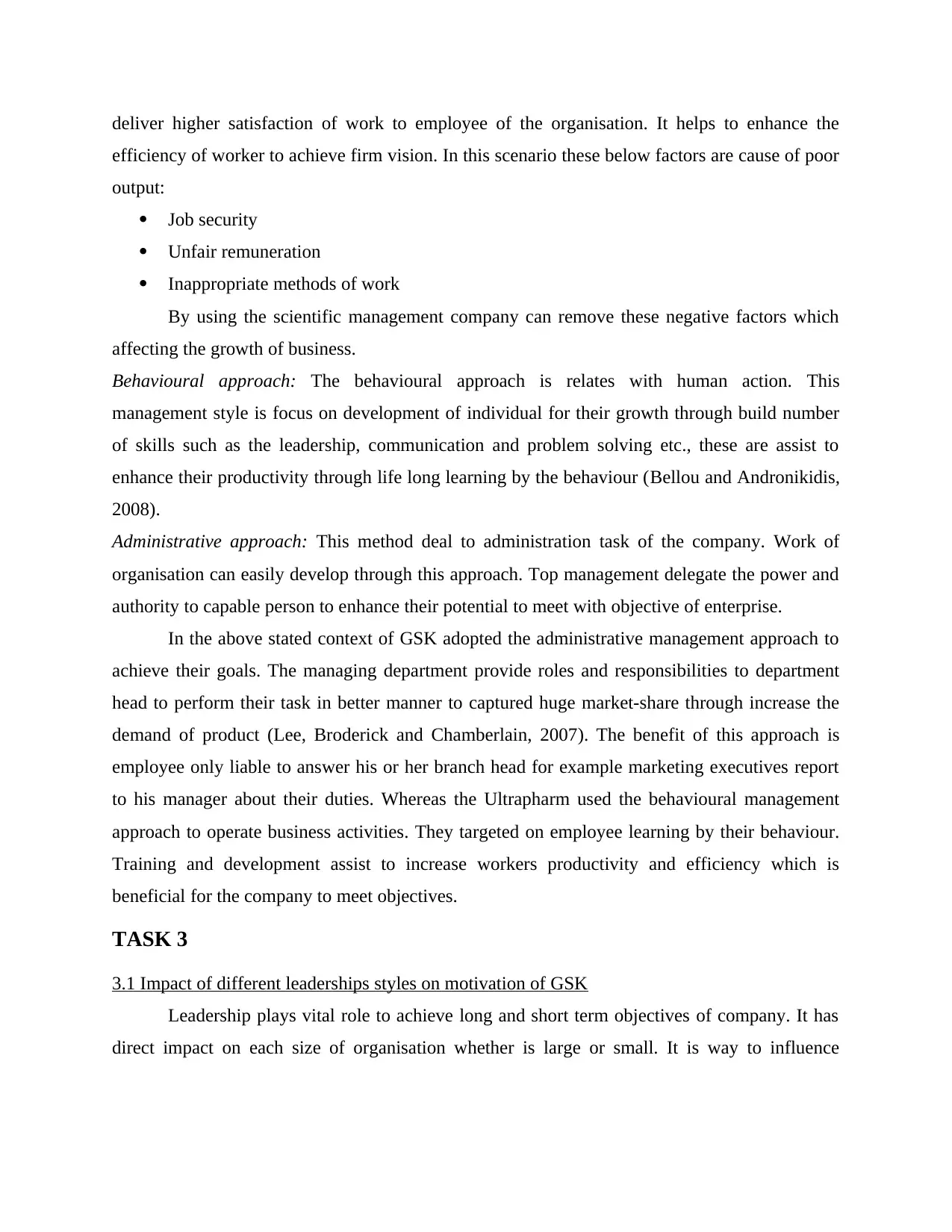
deliver higher satisfaction of work to employee of the organisation. It helps to enhance the
efficiency of worker to achieve firm vision. In this scenario these below factors are cause of poor
output:
Job security
Unfair remuneration
Inappropriate methods of work
By using the scientific management company can remove these negative factors which
affecting the growth of business.
Behavioural approach: The behavioural approach is relates with human action. This
management style is focus on development of individual for their growth through build number
of skills such as the leadership, communication and problem solving etc., these are assist to
enhance their productivity through life long learning by the behaviour (Bellou and Andronikidis,
2008).
Administrative approach: This method deal to administration task of the company. Work of
organisation can easily develop through this approach. Top management delegate the power and
authority to capable person to enhance their potential to meet with objective of enterprise.
In the above stated context of GSK adopted the administrative management approach to
achieve their goals. The managing department provide roles and responsibilities to department
head to perform their task in better manner to captured huge market-share through increase the
demand of product (Lee, Broderick and Chamberlain, 2007). The benefit of this approach is
employee only liable to answer his or her branch head for example marketing executives report
to his manager about their duties. Whereas the Ultrapharm used the behavioural management
approach to operate business activities. They targeted on employee learning by their behaviour.
Training and development assist to increase workers productivity and efficiency which is
beneficial for the company to meet objectives.
TASK 3
3.1 Impact of different leaderships styles on motivation of GSK
Leadership plays vital role to achieve long and short term objectives of company. It has
direct impact on each size of organisation whether is large or small. It is way to influence
efficiency of worker to achieve firm vision. In this scenario these below factors are cause of poor
output:
Job security
Unfair remuneration
Inappropriate methods of work
By using the scientific management company can remove these negative factors which
affecting the growth of business.
Behavioural approach: The behavioural approach is relates with human action. This
management style is focus on development of individual for their growth through build number
of skills such as the leadership, communication and problem solving etc., these are assist to
enhance their productivity through life long learning by the behaviour (Bellou and Andronikidis,
2008).
Administrative approach: This method deal to administration task of the company. Work of
organisation can easily develop through this approach. Top management delegate the power and
authority to capable person to enhance their potential to meet with objective of enterprise.
In the above stated context of GSK adopted the administrative management approach to
achieve their goals. The managing department provide roles and responsibilities to department
head to perform their task in better manner to captured huge market-share through increase the
demand of product (Lee, Broderick and Chamberlain, 2007). The benefit of this approach is
employee only liable to answer his or her branch head for example marketing executives report
to his manager about their duties. Whereas the Ultrapharm used the behavioural management
approach to operate business activities. They targeted on employee learning by their behaviour.
Training and development assist to increase workers productivity and efficiency which is
beneficial for the company to meet objectives.
TASK 3
3.1 Impact of different leaderships styles on motivation of GSK
Leadership plays vital role to achieve long and short term objectives of company. It has
direct impact on each size of organisation whether is large or small. It is way to influence
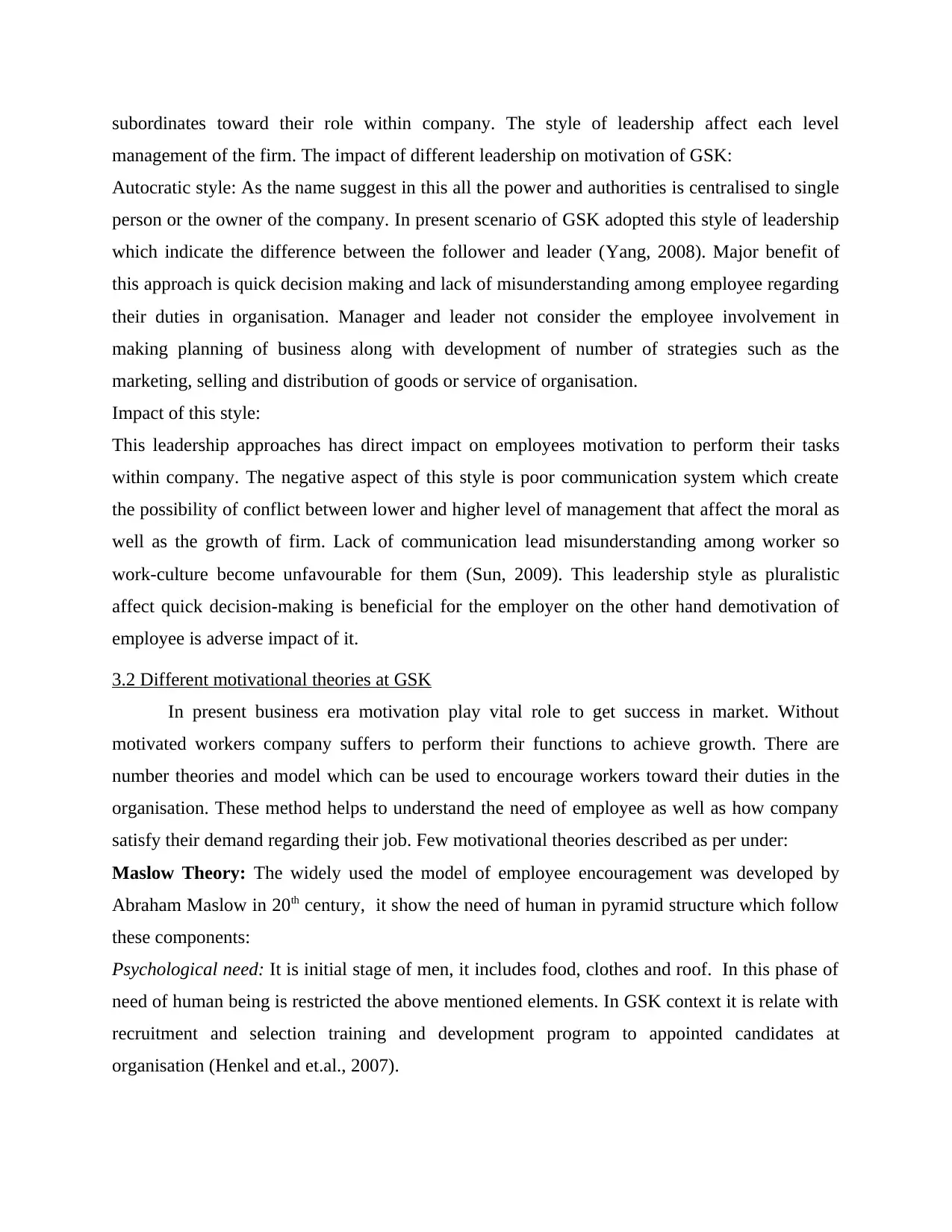
subordinates toward their role within company. The style of leadership affect each level
management of the firm. The impact of different leadership on motivation of GSK:
Autocratic style: As the name suggest in this all the power and authorities is centralised to single
person or the owner of the company. In present scenario of GSK adopted this style of leadership
which indicate the difference between the follower and leader (Yang, 2008). Major benefit of
this approach is quick decision making and lack of misunderstanding among employee regarding
their duties in organisation. Manager and leader not consider the employee involvement in
making planning of business along with development of number of strategies such as the
marketing, selling and distribution of goods or service of organisation.
Impact of this style:
This leadership approaches has direct impact on employees motivation to perform their tasks
within company. The negative aspect of this style is poor communication system which create
the possibility of conflict between lower and higher level of management that affect the moral as
well as the growth of firm. Lack of communication lead misunderstanding among worker so
work-culture become unfavourable for them (Sun, 2009). This leadership style as pluralistic
affect quick decision-making is beneficial for the employer on the other hand demotivation of
employee is adverse impact of it.
3.2 Different motivational theories at GSK
In present business era motivation play vital role to get success in market. Without
motivated workers company suffers to perform their functions to achieve growth. There are
number theories and model which can be used to encourage workers toward their duties in the
organisation. These method helps to understand the need of employee as well as how company
satisfy their demand regarding their job. Few motivational theories described as per under:
Maslow Theory: The widely used the model of employee encouragement was developed by
Abraham Maslow in 20th century, it show the need of human in pyramid structure which follow
these components:
Psychological need: It is initial stage of men, it includes food, clothes and roof. In this phase of
need of human being is restricted the above mentioned elements. In GSK context it is relate with
recruitment and selection training and development program to appointed candidates at
organisation (Henkel and et.al., 2007).
management of the firm. The impact of different leadership on motivation of GSK:
Autocratic style: As the name suggest in this all the power and authorities is centralised to single
person or the owner of the company. In present scenario of GSK adopted this style of leadership
which indicate the difference between the follower and leader (Yang, 2008). Major benefit of
this approach is quick decision making and lack of misunderstanding among employee regarding
their duties in organisation. Manager and leader not consider the employee involvement in
making planning of business along with development of number of strategies such as the
marketing, selling and distribution of goods or service of organisation.
Impact of this style:
This leadership approaches has direct impact on employees motivation to perform their tasks
within company. The negative aspect of this style is poor communication system which create
the possibility of conflict between lower and higher level of management that affect the moral as
well as the growth of firm. Lack of communication lead misunderstanding among worker so
work-culture become unfavourable for them (Sun, 2009). This leadership style as pluralistic
affect quick decision-making is beneficial for the employer on the other hand demotivation of
employee is adverse impact of it.
3.2 Different motivational theories at GSK
In present business era motivation play vital role to get success in market. Without
motivated workers company suffers to perform their functions to achieve growth. There are
number theories and model which can be used to encourage workers toward their duties in the
organisation. These method helps to understand the need of employee as well as how company
satisfy their demand regarding their job. Few motivational theories described as per under:
Maslow Theory: The widely used the model of employee encouragement was developed by
Abraham Maslow in 20th century, it show the need of human in pyramid structure which follow
these components:
Psychological need: It is initial stage of men, it includes food, clothes and roof. In this phase of
need of human being is restricted the above mentioned elements. In GSK context it is relate with
recruitment and selection training and development program to appointed candidates at
organisation (Henkel and et.al., 2007).
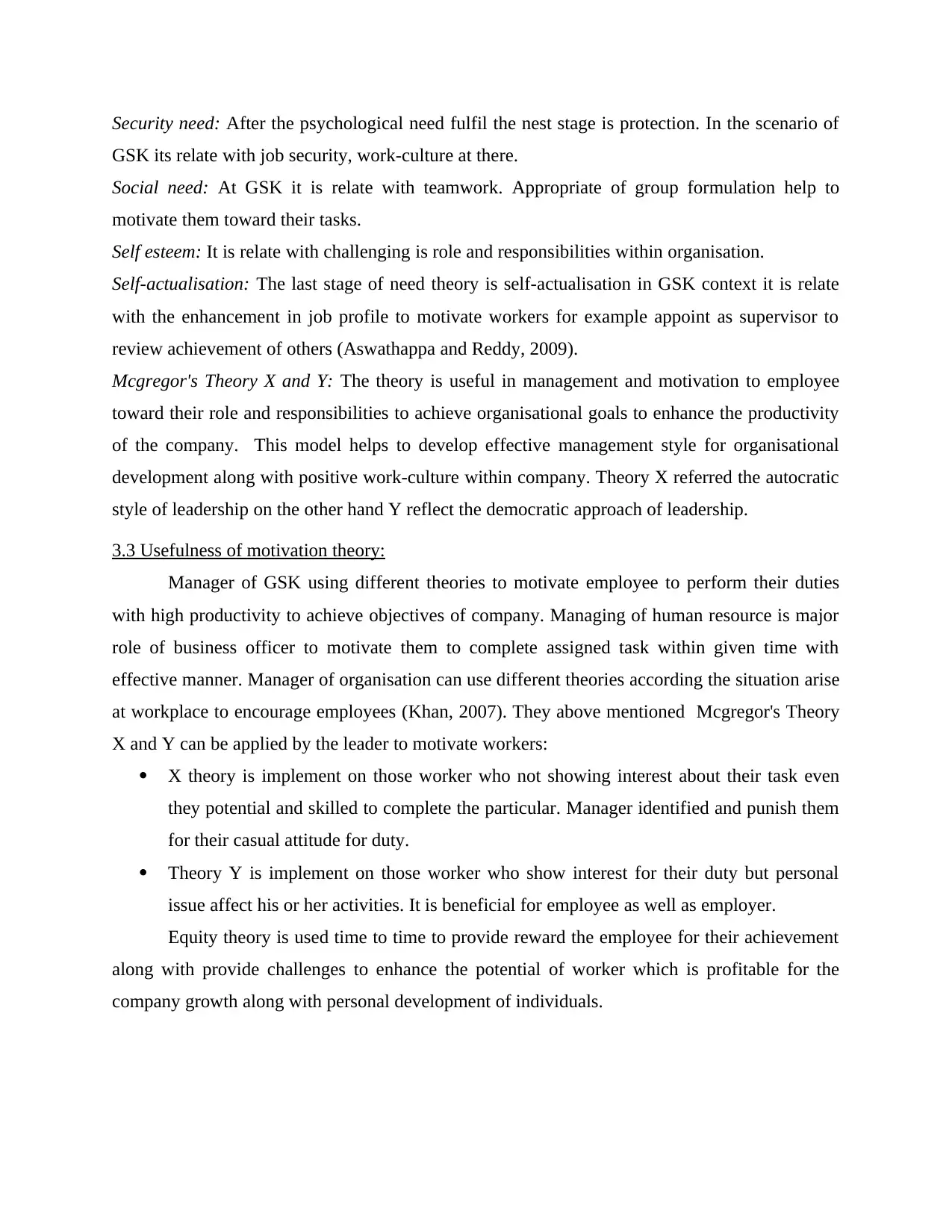
Security need: After the psychological need fulfil the nest stage is protection. In the scenario of
GSK its relate with job security, work-culture at there.
Social need: At GSK it is relate with teamwork. Appropriate of group formulation help to
motivate them toward their tasks.
Self esteem: It is relate with challenging is role and responsibilities within organisation.
Self-actualisation: The last stage of need theory is self-actualisation in GSK context it is relate
with the enhancement in job profile to motivate workers for example appoint as supervisor to
review achievement of others (Aswathappa and Reddy, 2009).
Mcgregor's Theory X and Y: The theory is useful in management and motivation to employee
toward their role and responsibilities to achieve organisational goals to enhance the productivity
of the company. This model helps to develop effective management style for organisational
development along with positive work-culture within company. Theory X referred the autocratic
style of leadership on the other hand Y reflect the democratic approach of leadership.
3.3 Usefulness of motivation theory:
Manager of GSK using different theories to motivate employee to perform their duties
with high productivity to achieve objectives of company. Managing of human resource is major
role of business officer to motivate them to complete assigned task within given time with
effective manner. Manager of organisation can use different theories according the situation arise
at workplace to encourage employees (Khan, 2007). They above mentioned Mcgregor's Theory
X and Y can be applied by the leader to motivate workers:
X theory is implement on those worker who not showing interest about their task even
they potential and skilled to complete the particular. Manager identified and punish them
for their casual attitude for duty.
Theory Y is implement on those worker who show interest for their duty but personal
issue affect his or her activities. It is beneficial for employee as well as employer.
Equity theory is used time to time to provide reward the employee for their achievement
along with provide challenges to enhance the potential of worker which is profitable for the
company growth along with personal development of individuals.
GSK its relate with job security, work-culture at there.
Social need: At GSK it is relate with teamwork. Appropriate of group formulation help to
motivate them toward their tasks.
Self esteem: It is relate with challenging is role and responsibilities within organisation.
Self-actualisation: The last stage of need theory is self-actualisation in GSK context it is relate
with the enhancement in job profile to motivate workers for example appoint as supervisor to
review achievement of others (Aswathappa and Reddy, 2009).
Mcgregor's Theory X and Y: The theory is useful in management and motivation to employee
toward their role and responsibilities to achieve organisational goals to enhance the productivity
of the company. This model helps to develop effective management style for organisational
development along with positive work-culture within company. Theory X referred the autocratic
style of leadership on the other hand Y reflect the democratic approach of leadership.
3.3 Usefulness of motivation theory:
Manager of GSK using different theories to motivate employee to perform their duties
with high productivity to achieve objectives of company. Managing of human resource is major
role of business officer to motivate them to complete assigned task within given time with
effective manner. Manager of organisation can use different theories according the situation arise
at workplace to encourage employees (Khan, 2007). They above mentioned Mcgregor's Theory
X and Y can be applied by the leader to motivate workers:
X theory is implement on those worker who not showing interest about their task even
they potential and skilled to complete the particular. Manager identified and punish them
for their casual attitude for duty.
Theory Y is implement on those worker who show interest for their duty but personal
issue affect his or her activities. It is beneficial for employee as well as employer.
Equity theory is used time to time to provide reward the employee for their achievement
along with provide challenges to enhance the potential of worker which is profitable for the
company growth along with personal development of individuals.
Secure Best Marks with AI Grader
Need help grading? Try our AI Grader for instant feedback on your assignments.
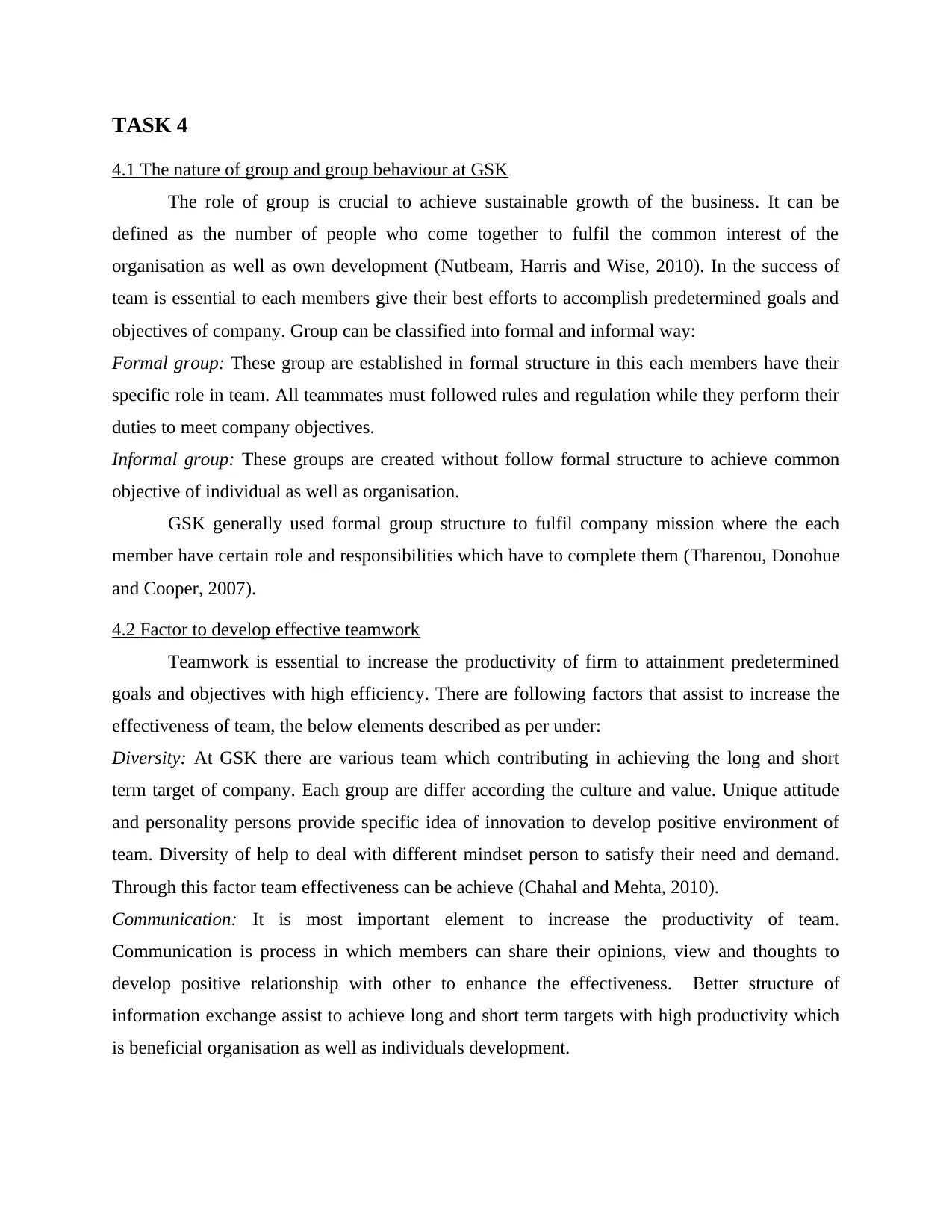
TASK 4
4.1 The nature of group and group behaviour at GSK
The role of group is crucial to achieve sustainable growth of the business. It can be
defined as the number of people who come together to fulfil the common interest of the
organisation as well as own development (Nutbeam, Harris and Wise, 2010). In the success of
team is essential to each members give their best efforts to accomplish predetermined goals and
objectives of company. Group can be classified into formal and informal way:
Formal group: These group are established in formal structure in this each members have their
specific role in team. All teammates must followed rules and regulation while they perform their
duties to meet company objectives.
Informal group: These groups are created without follow formal structure to achieve common
objective of individual as well as organisation.
GSK generally used formal group structure to fulfil company mission where the each
member have certain role and responsibilities which have to complete them (Tharenou, Donohue
and Cooper, 2007).
4.2 Factor to develop effective teamwork
Teamwork is essential to increase the productivity of firm to attainment predetermined
goals and objectives with high efficiency. There are following factors that assist to increase the
effectiveness of team, the below elements described as per under:
Diversity: At GSK there are various team which contributing in achieving the long and short
term target of company. Each group are differ according the culture and value. Unique attitude
and personality persons provide specific idea of innovation to develop positive environment of
team. Diversity of help to deal with different mindset person to satisfy their need and demand.
Through this factor team effectiveness can be achieve (Chahal and Mehta, 2010).
Communication: It is most important element to increase the productivity of team.
Communication is process in which members can share their opinions, view and thoughts to
develop positive relationship with other to enhance the effectiveness. Better structure of
information exchange assist to achieve long and short term targets with high productivity which
is beneficial organisation as well as individuals development.
4.1 The nature of group and group behaviour at GSK
The role of group is crucial to achieve sustainable growth of the business. It can be
defined as the number of people who come together to fulfil the common interest of the
organisation as well as own development (Nutbeam, Harris and Wise, 2010). In the success of
team is essential to each members give their best efforts to accomplish predetermined goals and
objectives of company. Group can be classified into formal and informal way:
Formal group: These group are established in formal structure in this each members have their
specific role in team. All teammates must followed rules and regulation while they perform their
duties to meet company objectives.
Informal group: These groups are created without follow formal structure to achieve common
objective of individual as well as organisation.
GSK generally used formal group structure to fulfil company mission where the each
member have certain role and responsibilities which have to complete them (Tharenou, Donohue
and Cooper, 2007).
4.2 Factor to develop effective teamwork
Teamwork is essential to increase the productivity of firm to attainment predetermined
goals and objectives with high efficiency. There are following factors that assist to increase the
effectiveness of team, the below elements described as per under:
Diversity: At GSK there are various team which contributing in achieving the long and short
term target of company. Each group are differ according the culture and value. Unique attitude
and personality persons provide specific idea of innovation to develop positive environment of
team. Diversity of help to deal with different mindset person to satisfy their need and demand.
Through this factor team effectiveness can be achieve (Chahal and Mehta, 2010).
Communication: It is most important element to increase the productivity of team.
Communication is process in which members can share their opinions, view and thoughts to
develop positive relationship with other to enhance the effectiveness. Better structure of
information exchange assist to achieve long and short term targets with high productivity which
is beneficial organisation as well as individuals development.
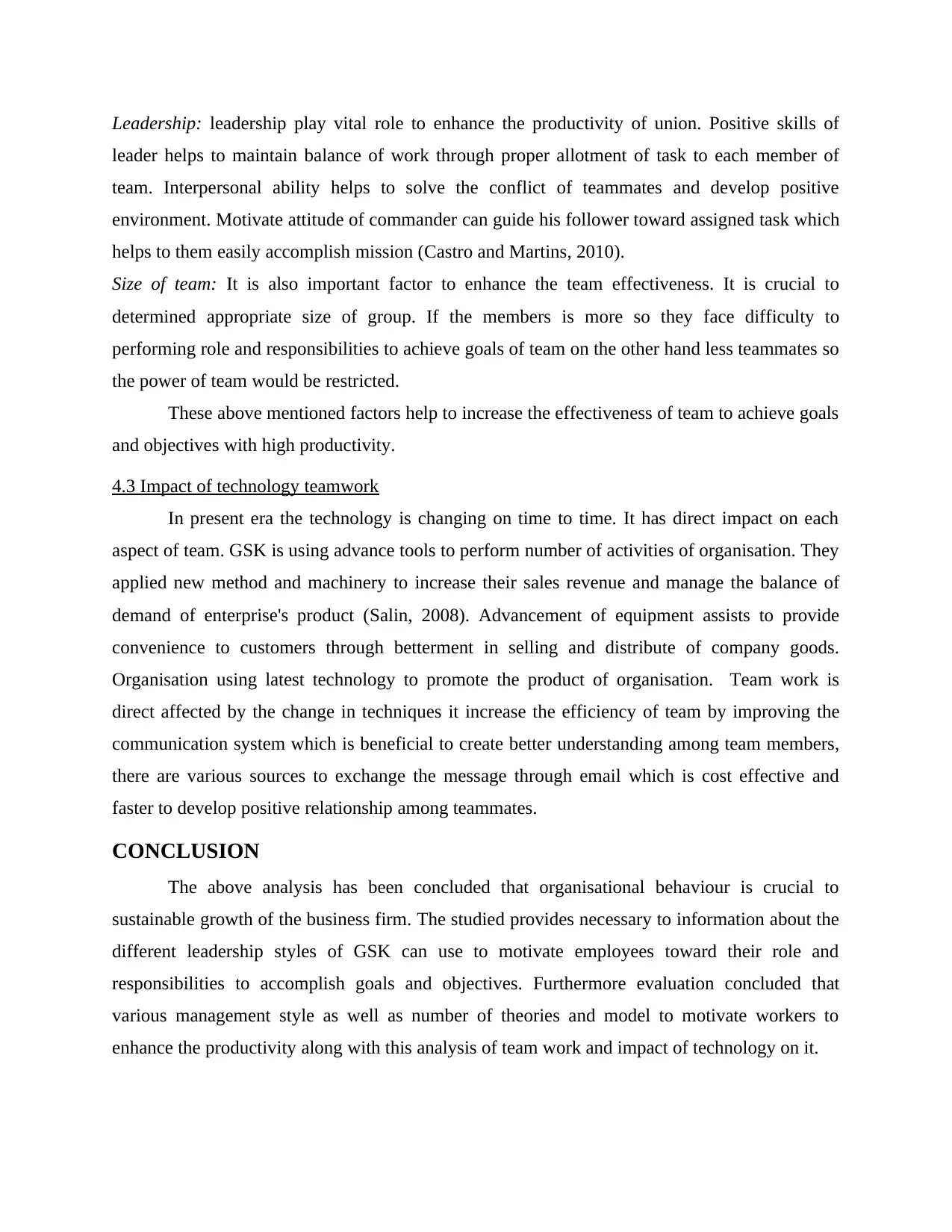
Leadership: leadership play vital role to enhance the productivity of union. Positive skills of
leader helps to maintain balance of work through proper allotment of task to each member of
team. Interpersonal ability helps to solve the conflict of teammates and develop positive
environment. Motivate attitude of commander can guide his follower toward assigned task which
helps to them easily accomplish mission (Castro and Martins, 2010).
Size of team: It is also important factor to enhance the team effectiveness. It is crucial to
determined appropriate size of group. If the members is more so they face difficulty to
performing role and responsibilities to achieve goals of team on the other hand less teammates so
the power of team would be restricted.
These above mentioned factors help to increase the effectiveness of team to achieve goals
and objectives with high productivity.
4.3 Impact of technology teamwork
In present era the technology is changing on time to time. It has direct impact on each
aspect of team. GSK is using advance tools to perform number of activities of organisation. They
applied new method and machinery to increase their sales revenue and manage the balance of
demand of enterprise's product (Salin, 2008). Advancement of equipment assists to provide
convenience to customers through betterment in selling and distribute of company goods.
Organisation using latest technology to promote the product of organisation. Team work is
direct affected by the change in techniques it increase the efficiency of team by improving the
communication system which is beneficial to create better understanding among team members,
there are various sources to exchange the message through email which is cost effective and
faster to develop positive relationship among teammates.
CONCLUSION
The above analysis has been concluded that organisational behaviour is crucial to
sustainable growth of the business firm. The studied provides necessary to information about the
different leadership styles of GSK can use to motivate employees toward their role and
responsibilities to accomplish goals and objectives. Furthermore evaluation concluded that
various management style as well as number of theories and model to motivate workers to
enhance the productivity along with this analysis of team work and impact of technology on it.
leader helps to maintain balance of work through proper allotment of task to each member of
team. Interpersonal ability helps to solve the conflict of teammates and develop positive
environment. Motivate attitude of commander can guide his follower toward assigned task which
helps to them easily accomplish mission (Castro and Martins, 2010).
Size of team: It is also important factor to enhance the team effectiveness. It is crucial to
determined appropriate size of group. If the members is more so they face difficulty to
performing role and responsibilities to achieve goals of team on the other hand less teammates so
the power of team would be restricted.
These above mentioned factors help to increase the effectiveness of team to achieve goals
and objectives with high productivity.
4.3 Impact of technology teamwork
In present era the technology is changing on time to time. It has direct impact on each
aspect of team. GSK is using advance tools to perform number of activities of organisation. They
applied new method and machinery to increase their sales revenue and manage the balance of
demand of enterprise's product (Salin, 2008). Advancement of equipment assists to provide
convenience to customers through betterment in selling and distribute of company goods.
Organisation using latest technology to promote the product of organisation. Team work is
direct affected by the change in techniques it increase the efficiency of team by improving the
communication system which is beneficial to create better understanding among team members,
there are various sources to exchange the message through email which is cost effective and
faster to develop positive relationship among teammates.
CONCLUSION
The above analysis has been concluded that organisational behaviour is crucial to
sustainable growth of the business firm. The studied provides necessary to information about the
different leadership styles of GSK can use to motivate employees toward their role and
responsibilities to accomplish goals and objectives. Furthermore evaluation concluded that
various management style as well as number of theories and model to motivate workers to
enhance the productivity along with this analysis of team work and impact of technology on it.
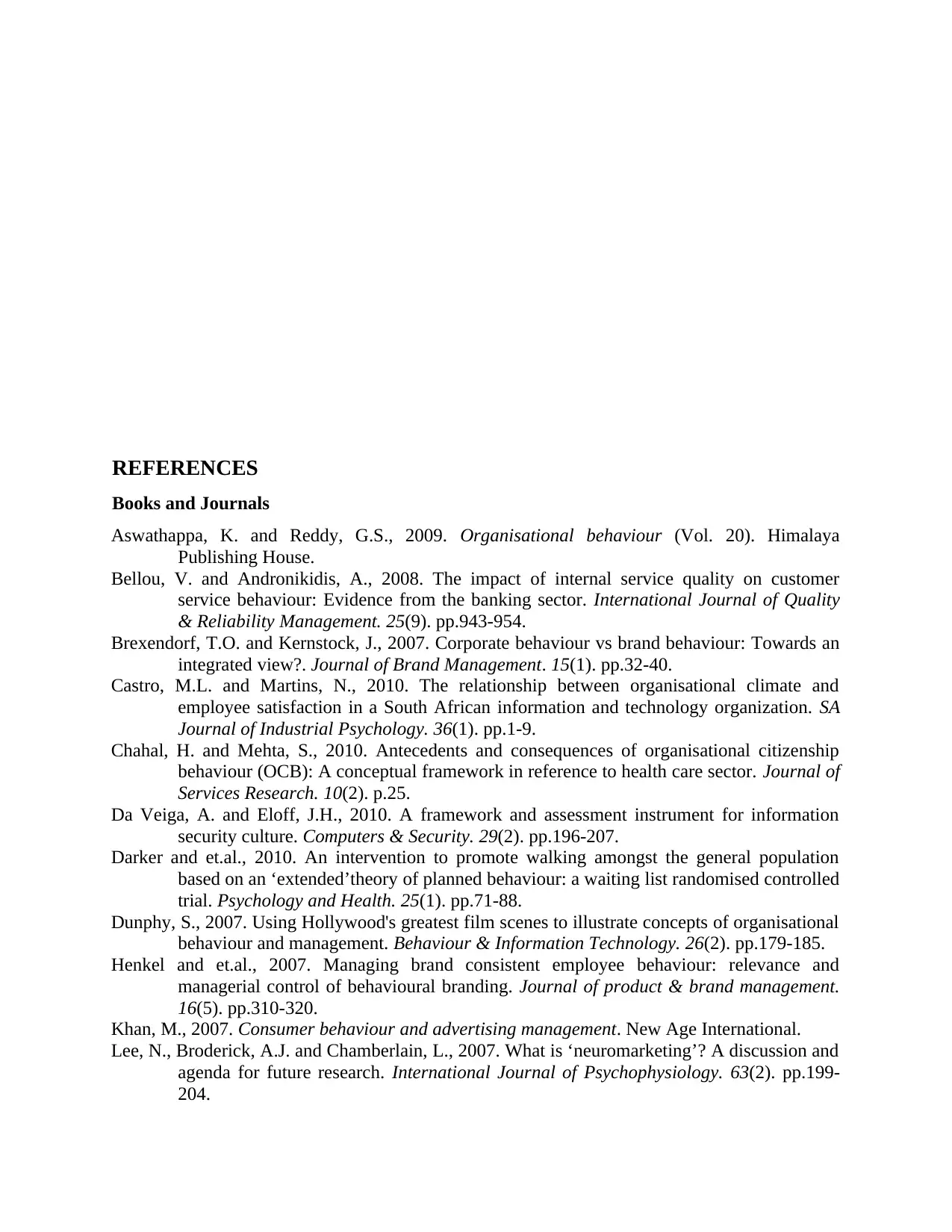
REFERENCES
Books and Journals
Aswathappa, K. and Reddy, G.S., 2009. Organisational behaviour (Vol. 20). Himalaya
Publishing House.
Bellou, V. and Andronikidis, A., 2008. The impact of internal service quality on customer
service behaviour: Evidence from the banking sector. International Journal of Quality
& Reliability Management. 25(9). pp.943-954.
Brexendorf, T.O. and Kernstock, J., 2007. Corporate behaviour vs brand behaviour: Towards an
integrated view?. Journal of Brand Management. 15(1). pp.32-40.
Castro, M.L. and Martins, N., 2010. The relationship between organisational climate and
employee satisfaction in a South African information and technology organization. SA
Journal of Industrial Psychology. 36(1). pp.1-9.
Chahal, H. and Mehta, S., 2010. Antecedents and consequences of organisational citizenship
behaviour (OCB): A conceptual framework in reference to health care sector. Journal of
Services Research. 10(2). p.25.
Da Veiga, A. and Eloff, J.H., 2010. A framework and assessment instrument for information
security culture. Computers & Security. 29(2). pp.196-207.
Darker and et.al., 2010. An intervention to promote walking amongst the general population
based on an ‘extended’theory of planned behaviour: a waiting list randomised controlled
trial. Psychology and Health. 25(1). pp.71-88.
Dunphy, S., 2007. Using Hollywood's greatest film scenes to illustrate concepts of organisational
behaviour and management. Behaviour & Information Technology. 26(2). pp.179-185.
Henkel and et.al., 2007. Managing brand consistent employee behaviour: relevance and
managerial control of behavioural branding. Journal of product & brand management.
16(5). pp.310-320.
Khan, M., 2007. Consumer behaviour and advertising management. New Age International.
Lee, N., Broderick, A.J. and Chamberlain, L., 2007. What is ‘neuromarketing’? A discussion and
agenda for future research. International Journal of Psychophysiology. 63(2). pp.199-
204.
Books and Journals
Aswathappa, K. and Reddy, G.S., 2009. Organisational behaviour (Vol. 20). Himalaya
Publishing House.
Bellou, V. and Andronikidis, A., 2008. The impact of internal service quality on customer
service behaviour: Evidence from the banking sector. International Journal of Quality
& Reliability Management. 25(9). pp.943-954.
Brexendorf, T.O. and Kernstock, J., 2007. Corporate behaviour vs brand behaviour: Towards an
integrated view?. Journal of Brand Management. 15(1). pp.32-40.
Castro, M.L. and Martins, N., 2010. The relationship between organisational climate and
employee satisfaction in a South African information and technology organization. SA
Journal of Industrial Psychology. 36(1). pp.1-9.
Chahal, H. and Mehta, S., 2010. Antecedents and consequences of organisational citizenship
behaviour (OCB): A conceptual framework in reference to health care sector. Journal of
Services Research. 10(2). p.25.
Da Veiga, A. and Eloff, J.H., 2010. A framework and assessment instrument for information
security culture. Computers & Security. 29(2). pp.196-207.
Darker and et.al., 2010. An intervention to promote walking amongst the general population
based on an ‘extended’theory of planned behaviour: a waiting list randomised controlled
trial. Psychology and Health. 25(1). pp.71-88.
Dunphy, S., 2007. Using Hollywood's greatest film scenes to illustrate concepts of organisational
behaviour and management. Behaviour & Information Technology. 26(2). pp.179-185.
Henkel and et.al., 2007. Managing brand consistent employee behaviour: relevance and
managerial control of behavioural branding. Journal of product & brand management.
16(5). pp.310-320.
Khan, M., 2007. Consumer behaviour and advertising management. New Age International.
Lee, N., Broderick, A.J. and Chamberlain, L., 2007. What is ‘neuromarketing’? A discussion and
agenda for future research. International Journal of Psychophysiology. 63(2). pp.199-
204.
Paraphrase This Document
Need a fresh take? Get an instant paraphrase of this document with our AI Paraphraser
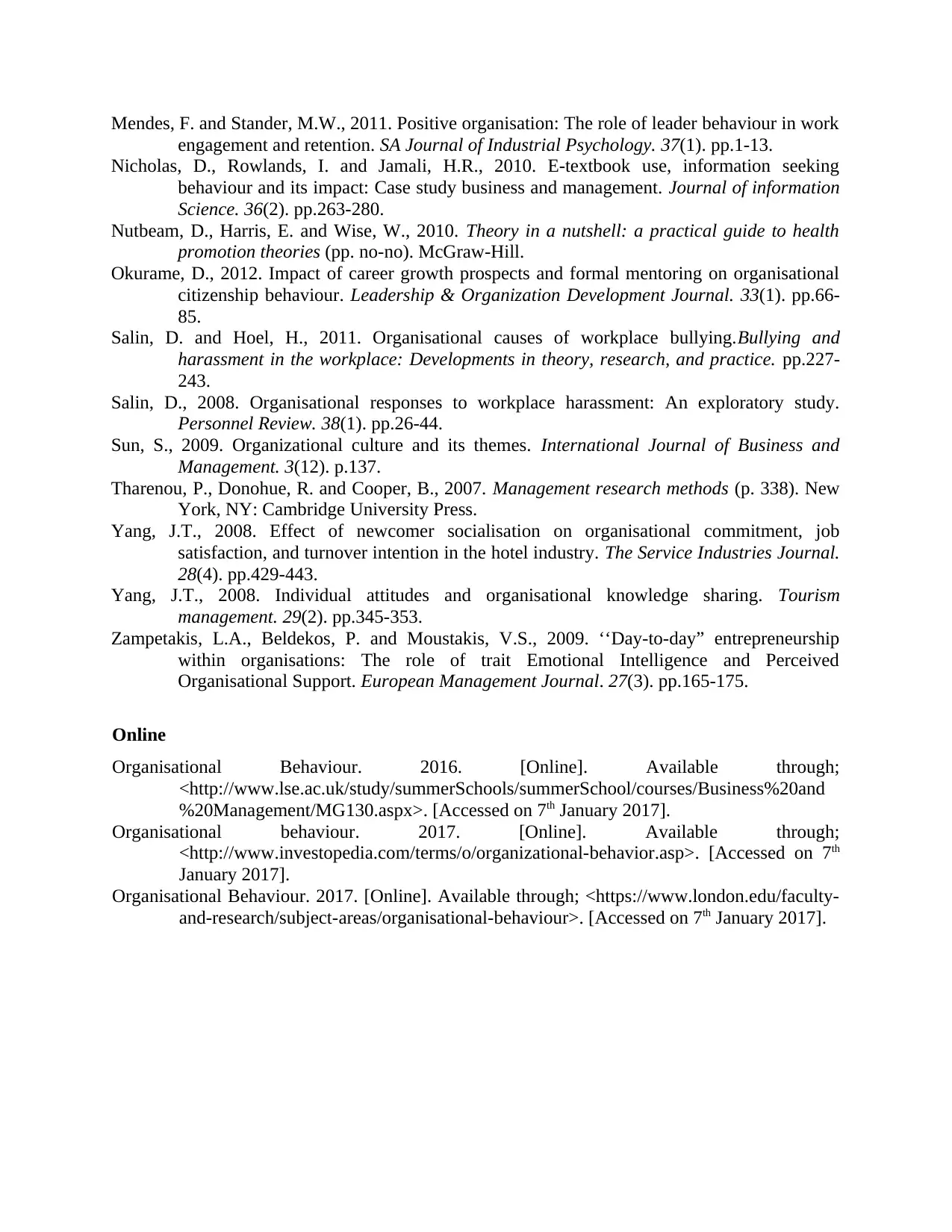
Mendes, F. and Stander, M.W., 2011. Positive organisation: The role of leader behaviour in work
engagement and retention. SA Journal of Industrial Psychology. 37(1). pp.1-13.
Nicholas, D., Rowlands, I. and Jamali, H.R., 2010. E-textbook use, information seeking
behaviour and its impact: Case study business and management. Journal of information
Science. 36(2). pp.263-280.
Nutbeam, D., Harris, E. and Wise, W., 2010. Theory in a nutshell: a practical guide to health
promotion theories (pp. no-no). McGraw-Hill.
Okurame, D., 2012. Impact of career growth prospects and formal mentoring on organisational
citizenship behaviour. Leadership & Organization Development Journal. 33(1). pp.66-
85.
Salin, D. and Hoel, H., 2011. Organisational causes of workplace bullying.Bullying and
harassment in the workplace: Developments in theory, research, and practice. pp.227-
243.
Salin, D., 2008. Organisational responses to workplace harassment: An exploratory study.
Personnel Review. 38(1). pp.26-44.
Sun, S., 2009. Organizational culture and its themes. International Journal of Business and
Management. 3(12). p.137.
Tharenou, P., Donohue, R. and Cooper, B., 2007. Management research methods (p. 338). New
York, NY: Cambridge University Press.
Yang, J.T., 2008. Effect of newcomer socialisation on organisational commitment, job
satisfaction, and turnover intention in the hotel industry. The Service Industries Journal.
28(4). pp.429-443.
Yang, J.T., 2008. Individual attitudes and organisational knowledge sharing. Tourism
management. 29(2). pp.345-353.
Zampetakis, L.A., Beldekos, P. and Moustakis, V.S., 2009. ‘‘Day-to-day” entrepreneurship
within organisations: The role of trait Emotional Intelligence and Perceived
Organisational Support. European Management Journal. 27(3). pp.165-175.
Online
Organisational Behaviour. 2016. [Online]. Available through;
<http://www.lse.ac.uk/study/summerSchools/summerSchool/courses/Business%20and
%20Management/MG130.aspx>. [Accessed on 7th January 2017].
Organisational behaviour. 2017. [Online]. Available through;
<http://www.investopedia.com/terms/o/organizational-behavior.asp>. [Accessed on 7th
January 2017].
Organisational Behaviour. 2017. [Online]. Available through; <https://www.london.edu/faculty-
and-research/subject-areas/organisational-behaviour>. [Accessed on 7th January 2017].
engagement and retention. SA Journal of Industrial Psychology. 37(1). pp.1-13.
Nicholas, D., Rowlands, I. and Jamali, H.R., 2010. E-textbook use, information seeking
behaviour and its impact: Case study business and management. Journal of information
Science. 36(2). pp.263-280.
Nutbeam, D., Harris, E. and Wise, W., 2010. Theory in a nutshell: a practical guide to health
promotion theories (pp. no-no). McGraw-Hill.
Okurame, D., 2012. Impact of career growth prospects and formal mentoring on organisational
citizenship behaviour. Leadership & Organization Development Journal. 33(1). pp.66-
85.
Salin, D. and Hoel, H., 2011. Organisational causes of workplace bullying.Bullying and
harassment in the workplace: Developments in theory, research, and practice. pp.227-
243.
Salin, D., 2008. Organisational responses to workplace harassment: An exploratory study.
Personnel Review. 38(1). pp.26-44.
Sun, S., 2009. Organizational culture and its themes. International Journal of Business and
Management. 3(12). p.137.
Tharenou, P., Donohue, R. and Cooper, B., 2007. Management research methods (p. 338). New
York, NY: Cambridge University Press.
Yang, J.T., 2008. Effect of newcomer socialisation on organisational commitment, job
satisfaction, and turnover intention in the hotel industry. The Service Industries Journal.
28(4). pp.429-443.
Yang, J.T., 2008. Individual attitudes and organisational knowledge sharing. Tourism
management. 29(2). pp.345-353.
Zampetakis, L.A., Beldekos, P. and Moustakis, V.S., 2009. ‘‘Day-to-day” entrepreneurship
within organisations: The role of trait Emotional Intelligence and Perceived
Organisational Support. European Management Journal. 27(3). pp.165-175.
Online
Organisational Behaviour. 2016. [Online]. Available through;
<http://www.lse.ac.uk/study/summerSchools/summerSchool/courses/Business%20and
%20Management/MG130.aspx>. [Accessed on 7th January 2017].
Organisational behaviour. 2017. [Online]. Available through;
<http://www.investopedia.com/terms/o/organizational-behavior.asp>. [Accessed on 7th
January 2017].
Organisational Behaviour. 2017. [Online]. Available through; <https://www.london.edu/faculty-
and-research/subject-areas/organisational-behaviour>. [Accessed on 7th January 2017].
1 out of 14
Related Documents
Your All-in-One AI-Powered Toolkit for Academic Success.
+13062052269
info@desklib.com
Available 24*7 on WhatsApp / Email
![[object Object]](/_next/static/media/star-bottom.7253800d.svg)
Unlock your academic potential
© 2024 | Zucol Services PVT LTD | All rights reserved.





